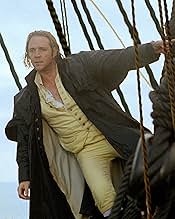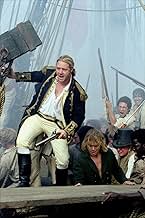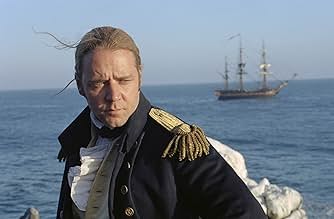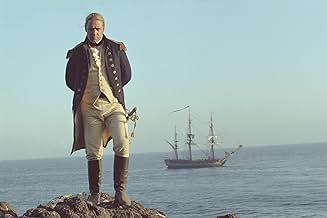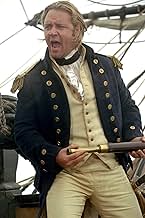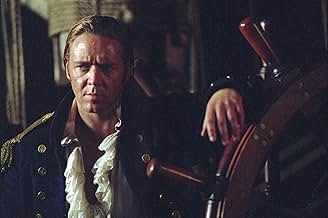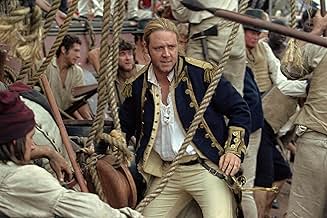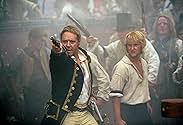Capitán de mar y guerra: La costa más lejana del mundo
Título original: Master and Commander: The Far Side of the World
Durante las guerras napoleónicas, un intrépido capitán británico presiona a su barco y tripulación hasta el límite, en busca de un formidable barco de guerra francés que navega por Sudaméric... Leer todoDurante las guerras napoleónicas, un intrépido capitán británico presiona a su barco y tripulación hasta el límite, en busca de un formidable barco de guerra francés que navega por Sudamérica.Durante las guerras napoleónicas, un intrépido capitán británico presiona a su barco y tripulación hasta el límite, en busca de un formidable barco de guerra francés que navega por Sudamérica.
- Dirección
- Guionistas
- Elenco
- Ganó 2 premios Óscar
- 23 premios ganados y 90 nominaciones en total
- Dirección
- Guionistas
- Todo el elenco y el equipo
- Producción, taquilla y más en IMDbPro
Opiniones destacadas
"Master and Commander: The Far Side of the World" is a very unusual film because the filmmakers obviously were not attempting to make yet another Hollywood style blockbuster. Instead, they seemed to be doing the impossible--make a film that tries very hard to replicate what life was like at sea back during the Napoleonic Wars. As a retired history teacher, this is the sort of stuff I love--even if in the original, the 'bad guys' were actually the Americans and it was set during the War of 1812! I assume they changed the enemy to the French to make the film more marketable. After all, it would be a hard sell in the large American market to get the audiences to root for the British Navy in this altercation! The story occurs around the beginning of the 19th century. The Brits and French have been fighting off and on for almost a decade (and would continue to do so until 1815). The action is set aboard a British Naval ship commanded by Captain Jack Aubrey (Russell Crowe). His ship has encountered a larger and faster French vessel and managed to escape. However, instead of running, Crowe plays a very determined man--and spends much of the film hunting down this ship. Along the way, there are lots of adventures--mostly of the variety you might actually have seen during the era. I could talk about them, but frankly this would spoil the suspense.
Overall, while this film is very slowly and deliberately paced (which will obviously turn off some viewers), the film is so expertly crafted that for a reasonably patient viewer, it should be a very engaging film. The film looks great--with a lot of attention to details and accuracy. It also has the best looking sea footage you can find in a period film--especially when the ship is rounding the Cape (it must have been amazing on the big screen). The acting is lovely as well--understated but quite realistic. Well done in every way and the director really deserves kudos for this one. While I love films from the same period as "Damn the Defiant", "Captain Horatio Hornblower", "Mutiny on the Bounty" and the like, clearly "Master and Commander" is superior when it comes to accurately portraying the life of a seaman.
Overall, while this film is very slowly and deliberately paced (which will obviously turn off some viewers), the film is so expertly crafted that for a reasonably patient viewer, it should be a very engaging film. The film looks great--with a lot of attention to details and accuracy. It also has the best looking sea footage you can find in a period film--especially when the ship is rounding the Cape (it must have been amazing on the big screen). The acting is lovely as well--understated but quite realistic. Well done in every way and the director really deserves kudos for this one. While I love films from the same period as "Damn the Defiant", "Captain Horatio Hornblower", "Mutiny on the Bounty" and the like, clearly "Master and Commander" is superior when it comes to accurately portraying the life of a seaman.
Normally, I do not begrudge someone their opinion about a movie, but when they cast aspersions about other reviewers here, I feel compelled to respond. One disgruntled reviewer of this film stated that she cannot understand how anyone could like this movie, let alone love it. Further, she claimed that we, the other reviewers, only believe what we are told to believe. Nothing could be further from the truth.
That someone would loathe what others have lauded is not surprising, really. I have to admit that I, too, have disliked films that were highly rated by a large majority of film critics. 'Fargo' comes to mind as does 'Moulin Rouge' and 'Mystic River.' However, unlike the reviewer, I watched these films several times over before reaching a final judgment in the event that I had been too hasty in my initial impressions. Neither of these films, though, were hailed as classics like 'MASTER AND COMMANDER'
Many people go into a theatre with a preconceived notion of what they think they will see, only to be disappointed when what they see is not what they expected. Each person carries with them their own set of experiences and no amount of explanation or arguments will change their mind, either. Yet, once in awhile a movie transcends the boundaries that define it, and its true genius is not something that everyone is going to apprehend. This is the case with 'MASTER AND COMMANDER'.
All I can say to that reviewer is simply, 'I am really sorry that you were not able to see what I saw.'
Movies like 'MASTER AND COMMANDER' only come around once in a generation. It is, without question, the finest movie ever made about tall ships. However, its greatness lies not in the story line but in those elements that typically ruin what would otherwise be great historical films, namely: dialogue, special effects, and sound track. Take for example, 'Gangs of New York.' The cinematography and sets were outstanding but the dialogue of everyone but Daniel Day-Lewis was severely lacking in historical authenticity. Another example is the 'Passion of the Christ' which used a mix of Aramaic and Hebrew to add its authentic feel, but it came across as highly artificial.
'MASTER AND COMMANDER' brought to life a language totally forgotten: the language of the sea, circa early 1800's. Every actor spoke the language as if they were born into it, and that element alone made the viewer feel as if they were viewing a window in time of a world rarely seen.
The sound editing alone was worth the price of admission. I have never been to a film where I actually felt that I was part of the environment. 'MASTER AND COMMANDER' did that, and even if you play the DVD on a plain TV, you would still marvel at the realism of the sound.
Finally, unlike every other sea movie that preceded it, the special effects were seamlessly integrated into the real footage of the ships at sea. At no time, did I get the sense that I was watching a scale model in a tank. In reality, the actual ship passed through rough seas on its journey around the Horn and these real scenes were added to the movie.
All these factors I mentioned above set the movie apart but that does not mean it had a substandard plot and mediocre acting. On the contrary, Russell Crowe was at his best playing Lucky Jack Aubrey with a panache that could only be matched by the late Errol Flynn. If I were a seaman aboard the HMS Surprise, I would truly feel that I could follow him anywhere. Crowe commands both the stage and the ship wherever he goes.
Paul Bettany as Jack's most trusted friend and the ship's doctor, turns in his best performance to date. Another unusual part of this movie is that while no seagoing fare would be complete without a love affair, the one in this movie is a platonic one between the captain and the doctor.
The two have a special relationship that is constantly strained by Crowe's call to duty and his overarching ambition. Having served with the great Lord Nelson, Lucky Jack does his best to emulate him and carve out a piece of British naval history for himself.
The film reminded me of works like 'Run Silent, Run Deep' which although dealt with more contemporary battles at sea (WWII), also featured a classic battle of wits between unseen adversaries. We never get to meet Jack's nemesis directly, but we learn by his battle tactics that he is a worthy opponent and a lot like Jack himself.
'MASTER AND COMMANDER' is a movie that I never tire of watching, and each time I see it I learn something new. It has its weaknesses like every movie does. It lacks continuity and subplots. It lacks character development of some of the more interesting supporting actors. Often I found it hard to keep track of who is who when everyone is referred to by their last names. Yet, all in all, 'MASTER AND COMMANDER' is a must-see movie and a must-own DVD.
That someone would loathe what others have lauded is not surprising, really. I have to admit that I, too, have disliked films that were highly rated by a large majority of film critics. 'Fargo' comes to mind as does 'Moulin Rouge' and 'Mystic River.' However, unlike the reviewer, I watched these films several times over before reaching a final judgment in the event that I had been too hasty in my initial impressions. Neither of these films, though, were hailed as classics like 'MASTER AND COMMANDER'
Many people go into a theatre with a preconceived notion of what they think they will see, only to be disappointed when what they see is not what they expected. Each person carries with them their own set of experiences and no amount of explanation or arguments will change their mind, either. Yet, once in awhile a movie transcends the boundaries that define it, and its true genius is not something that everyone is going to apprehend. This is the case with 'MASTER AND COMMANDER'.
All I can say to that reviewer is simply, 'I am really sorry that you were not able to see what I saw.'
Movies like 'MASTER AND COMMANDER' only come around once in a generation. It is, without question, the finest movie ever made about tall ships. However, its greatness lies not in the story line but in those elements that typically ruin what would otherwise be great historical films, namely: dialogue, special effects, and sound track. Take for example, 'Gangs of New York.' The cinematography and sets were outstanding but the dialogue of everyone but Daniel Day-Lewis was severely lacking in historical authenticity. Another example is the 'Passion of the Christ' which used a mix of Aramaic and Hebrew to add its authentic feel, but it came across as highly artificial.
'MASTER AND COMMANDER' brought to life a language totally forgotten: the language of the sea, circa early 1800's. Every actor spoke the language as if they were born into it, and that element alone made the viewer feel as if they were viewing a window in time of a world rarely seen.
The sound editing alone was worth the price of admission. I have never been to a film where I actually felt that I was part of the environment. 'MASTER AND COMMANDER' did that, and even if you play the DVD on a plain TV, you would still marvel at the realism of the sound.
Finally, unlike every other sea movie that preceded it, the special effects were seamlessly integrated into the real footage of the ships at sea. At no time, did I get the sense that I was watching a scale model in a tank. In reality, the actual ship passed through rough seas on its journey around the Horn and these real scenes were added to the movie.
All these factors I mentioned above set the movie apart but that does not mean it had a substandard plot and mediocre acting. On the contrary, Russell Crowe was at his best playing Lucky Jack Aubrey with a panache that could only be matched by the late Errol Flynn. If I were a seaman aboard the HMS Surprise, I would truly feel that I could follow him anywhere. Crowe commands both the stage and the ship wherever he goes.
Paul Bettany as Jack's most trusted friend and the ship's doctor, turns in his best performance to date. Another unusual part of this movie is that while no seagoing fare would be complete without a love affair, the one in this movie is a platonic one between the captain and the doctor.
The two have a special relationship that is constantly strained by Crowe's call to duty and his overarching ambition. Having served with the great Lord Nelson, Lucky Jack does his best to emulate him and carve out a piece of British naval history for himself.
The film reminded me of works like 'Run Silent, Run Deep' which although dealt with more contemporary battles at sea (WWII), also featured a classic battle of wits between unseen adversaries. We never get to meet Jack's nemesis directly, but we learn by his battle tactics that he is a worthy opponent and a lot like Jack himself.
'MASTER AND COMMANDER' is a movie that I never tire of watching, and each time I see it I learn something new. It has its weaknesses like every movie does. It lacks continuity and subplots. It lacks character development of some of the more interesting supporting actors. Often I found it hard to keep track of who is who when everyone is referred to by their last names. Yet, all in all, 'MASTER AND COMMANDER' is a must-see movie and a must-own DVD.
"Master and Commander: The Far Side of the World" is half swashbuckling action movie, half detailed examination of life in the 19th-century British navy, and all entertaining. Director Peter Weir has created an intriguing film that nicely balances fierce battle sequences with quiet, intimate scenes.
Nearly all of the film takes place aboard the HMS Surprise, under the command of Captain "Lucky" Jack Aubrey (Russell Crowe). The captain's orders: to intercept and disable the French privateer Acheron, which is troubling British vessels off the coast of South America. The two ships clash early on, and the Surprise is thoroughly routed--the Acheron is larger, faster, and more modern. But Aubrey, with a determination that might not entirely be due to his sense of duty, is not one to give up, and the Surprise chases the Acheron--and/or vice versa--down the Brazilian coast, around Cape Horn, and to the Gallapagos Islands.
That's the action part. The intimate part involves Aubrey's relationship with the ship's surgeon, Stephan Marutin (Paul Bettany). Stephan is a quiet intellectual and devout naturallist, whose train of thought is foraying into the territory that would make Darwin a household name later in the century. He's also the only one among the crew who's either willing or able to call Aubrey's decisions into question. He provides a grounding force for the captain, and the friendship between these two dissimilar men is the emotional heart of the story.
I've yet to read any of the Patrick O'Brian series upon which "Master and Commander" is based, but the movie shows every evidence of being derived from a painstakingly and meticulously detailed work, one which has gone to great lengths to re-create the world and environment of these men. The details on screen are wonderful, depicting the sort of harsh conditions that make the contestants on those "reality" series look like the overglorified wimps they are. The crew of the Surprise (many of them not older than twenty) lives in claustrophobic and none-too-clean quarters--at times it seems as if every inch of the screen is crammed full--and sleep in hammocks that may very well end up serving as their shrouds. Battles are chaotic, with cannon fire ripping huge holes in the ship and sending shrapnel in every direction. The weather seems to exist only in extremes: still heat, raging tempests, even snow as they drift down near the Antarctic circle. Good service is rewarded with extra rations of grog and brandy, insubordination is punished by the whip. It's a place where both close friendships and deep resentments can grow, and the tension in the air at times feels like a living presence.
Crowe dominates the production, once again proving himself one of the best leading men working in movies. In his hands, Jack Aubrey is a natural leader of men: clever, courageous, determined, and capable of what nowadays is called "thinking outside the box." He is frequently confronted with difficult choices, but takes his responsibilities and the consequences of his actions unflinchingly. Bettany turns in an equally good performance as Aubrey's emotional and ideological opposite; the two men play wonderfully off of each other. Most of the rest of the crew tends to blur together (the exceptions include a young officer who's right arm gets amputated early on, and later takes command of the ship), but "Lord of the Rings" fans will be amused to notice Billy Boyd among the ranks.
The combination of action and introspection in "Master and Commander" at times seems like an odd mix, but the film succeeds on both levels. Definitely a voyage worth taking.
Nearly all of the film takes place aboard the HMS Surprise, under the command of Captain "Lucky" Jack Aubrey (Russell Crowe). The captain's orders: to intercept and disable the French privateer Acheron, which is troubling British vessels off the coast of South America. The two ships clash early on, and the Surprise is thoroughly routed--the Acheron is larger, faster, and more modern. But Aubrey, with a determination that might not entirely be due to his sense of duty, is not one to give up, and the Surprise chases the Acheron--and/or vice versa--down the Brazilian coast, around Cape Horn, and to the Gallapagos Islands.
That's the action part. The intimate part involves Aubrey's relationship with the ship's surgeon, Stephan Marutin (Paul Bettany). Stephan is a quiet intellectual and devout naturallist, whose train of thought is foraying into the territory that would make Darwin a household name later in the century. He's also the only one among the crew who's either willing or able to call Aubrey's decisions into question. He provides a grounding force for the captain, and the friendship between these two dissimilar men is the emotional heart of the story.
I've yet to read any of the Patrick O'Brian series upon which "Master and Commander" is based, but the movie shows every evidence of being derived from a painstakingly and meticulously detailed work, one which has gone to great lengths to re-create the world and environment of these men. The details on screen are wonderful, depicting the sort of harsh conditions that make the contestants on those "reality" series look like the overglorified wimps they are. The crew of the Surprise (many of them not older than twenty) lives in claustrophobic and none-too-clean quarters--at times it seems as if every inch of the screen is crammed full--and sleep in hammocks that may very well end up serving as their shrouds. Battles are chaotic, with cannon fire ripping huge holes in the ship and sending shrapnel in every direction. The weather seems to exist only in extremes: still heat, raging tempests, even snow as they drift down near the Antarctic circle. Good service is rewarded with extra rations of grog and brandy, insubordination is punished by the whip. It's a place where both close friendships and deep resentments can grow, and the tension in the air at times feels like a living presence.
Crowe dominates the production, once again proving himself one of the best leading men working in movies. In his hands, Jack Aubrey is a natural leader of men: clever, courageous, determined, and capable of what nowadays is called "thinking outside the box." He is frequently confronted with difficult choices, but takes his responsibilities and the consequences of his actions unflinchingly. Bettany turns in an equally good performance as Aubrey's emotional and ideological opposite; the two men play wonderfully off of each other. Most of the rest of the crew tends to blur together (the exceptions include a young officer who's right arm gets amputated early on, and later takes command of the ship), but "Lord of the Rings" fans will be amused to notice Billy Boyd among the ranks.
The combination of action and introspection in "Master and Commander" at times seems like an odd mix, but the film succeeds on both levels. Definitely a voyage worth taking.
Few films manage to capture the era in which the original work was set and often rely on clichés of the particular genre at the expense of the core story. This film manages to avoid these pitfalls but more importantly serves as a worthwhile historical document. Anyone who is new to this period of history will not go far wrong keeping a copy of this movie as the attention to detail is excellent and adds to the experience as a whole (teachers take note).
This movie manages to tread a fine line between gritty realism and Boy's Own, portraying the pursuit of an elite French warship by an older embattled British frigate. The production values are very high and the dialogue and length allow the director a better than average framework for character development. The predominantly unknown British supporting cast (some aged as young as 12) are expertly handled and provide a counter balance to the excellent performances of Crowe and Bettany. Crowe's delivery is very reminiscent of Richard Burton, exuding a measured screen presence without overpowering the dialogue.
It would have been easy for the director to read through the salty notes of previous period pieces and deliver the usual tale of ocean going brutality and scurvy encrusted woe but Peter Weir's version of order through respect and camaraderie is far more believable especially when you realize that the sailor's greatest enemy was the ocean itself.
I found little to dislike and much to admire. Highly recommended.
This movie manages to tread a fine line between gritty realism and Boy's Own, portraying the pursuit of an elite French warship by an older embattled British frigate. The production values are very high and the dialogue and length allow the director a better than average framework for character development. The predominantly unknown British supporting cast (some aged as young as 12) are expertly handled and provide a counter balance to the excellent performances of Crowe and Bettany. Crowe's delivery is very reminiscent of Richard Burton, exuding a measured screen presence without overpowering the dialogue.
It would have been easy for the director to read through the salty notes of previous period pieces and deliver the usual tale of ocean going brutality and scurvy encrusted woe but Peter Weir's version of order through respect and camaraderie is far more believable especially when you realize that the sailor's greatest enemy was the ocean itself.
I found little to dislike and much to admire. Highly recommended.
There is a scene in MASTER AND COMMANDER: THE FAR SIDE OF THE WORLD where the captain of a British Naval ship, circa 1805, debates the difference between duty and passion. Having passed on an opportunity to make wonderful new discoveries in favor of the pursuit of a massive French war ship, the scene manages to make a rather eloquent, yet subtle comment on the nature of man and his place within the world. The beauty of this film is that there are many such moments where the viewer is simultaneously bombarded with thematic musings, exciting action sequences, great acting and historical accuracy to the point where it becomes difficult to take it all in at once.
Those of you looking for something more like Pirates of the Caribbean will be disappointed as this film is short on action and long on character development. There are only two major battle sequences, separated by more than an hour and a half of time. And while they are great; violently realistic and dramatically involving, the real guts of this film lies in the human stories told along the way. The director, Peter Weir, highlights his ability to tell an intimate story amidst a grand backdrop much like he did in The Truman Show. We get to know these men, their strengths and weaknesses and we see how the long and hard voyage plays on their minds over the film's progression. In one scene, a young officer feels the pressure of his men's dismissive stares and decides to end matters in his own way, afraid of what may be in store for him should he stick it out. Weir does a good job at highlighting the many facets of seafaring life.
If you're looking for an intelligent and thought-provoking journey into the life of a 19th Century British Naval Vessell, look no further. Master and Commander has the depth of a good Discovery Channel show and the action worthy of almost any other high-seas adventure that comes to mind.
Those of you looking for something more like Pirates of the Caribbean will be disappointed as this film is short on action and long on character development. There are only two major battle sequences, separated by more than an hour and a half of time. And while they are great; violently realistic and dramatically involving, the real guts of this film lies in the human stories told along the way. The director, Peter Weir, highlights his ability to tell an intimate story amidst a grand backdrop much like he did in The Truman Show. We get to know these men, their strengths and weaknesses and we see how the long and hard voyage plays on their minds over the film's progression. In one scene, a young officer feels the pressure of his men's dismissive stares and decides to end matters in his own way, afraid of what may be in store for him should he stick it out. Weir does a good job at highlighting the many facets of seafaring life.
If you're looking for an intelligent and thought-provoking journey into the life of a 19th Century British Naval Vessell, look no further. Master and Commander has the depth of a good Discovery Channel show and the action worthy of almost any other high-seas adventure that comes to mind.
¿Sabías que…?
- TriviaRussell Crowe learned to play violin for the film and referred to it as the hardest thing he'd ever done for a film.
- ErroresDuring the Storm when the Surprise is chasing the Acheron around Cape Horn, Barrett Bonden is shown alone at the wheel. It was customary on a Royal Navy vessel of the time to always have at least two men at the wheel both as a security measure in case one man was injured in battle, and because the rudder itself was extremely heavy and difficult to turn. During any sort of heavy weather there would certainly have been four or more men at the wheel as one man would not be able to control the rudder (which is why the ship has two connected wheels).
- Citas
[Toasting]
Capt. Jack Aubrey: To wives and sweethearts.
Officers: To wives and sweethearts.
Capt. Jack Aubrey: May they never meet.
- Créditos curiososThere are no opening credits.
- ConexionesEdited into Spisok korabley (2008)
- Bandas sonorasGhost of Time
Composed by Iva Davies, Christopher Gordon and Richard Tognetti
Performed by Iva Davies and Icehouse
Featured Violin Performance by Richard Tognetti
Orchestrated by Christopher Gordon
Selecciones populares
Inicia sesión para calificar y agrega a la lista de videos para obtener recomendaciones personalizadas
- How long is Master and Commander: The Far Side of the World?Con tecnología de Alexa
Detalles
- Fecha de lanzamiento
- País de origen
- Sitios oficiales
- Idiomas
- También se conoce como
- Master and Commander: The Far Side of the World
- Locaciones de filmación
- Productoras
- Ver más créditos de la compañía en IMDbPro
Taquilla
- Presupuesto
- USD 150,000,000 (estimado)
- Total en EE. UU. y Canadá
- USD 93,927,920
- Fin de semana de estreno en EE. UU. y Canadá
- USD 25,105,990
- 16 nov 2003
- Total a nivel mundial
- USD 211,623,421
- Tiempo de ejecución2 horas 18 minutos
- Color
- Mezcla de sonido
- Relación de aspecto
- 2.39 : 1
Contribuir a esta página
Sugiere una edición o agrega el contenido que falta

Principales brechas de datos
What was the official certification given to Capitán de mar y guerra: La costa más lejana del mundo (2003) in India?
Responda






